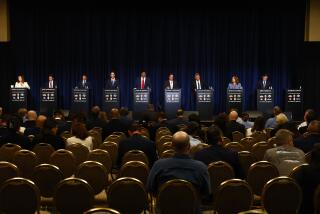Garcetti’s Chances Were Slim, Analysts Say
- Share via
Did Gil Garcetti ever have a chance?
Under other circumstances, it might be an odd question to ask about a charismatic, savvy district attorney who had the support of virtually the entire Los Angeles County political establishment in his bid for a third term.
But after Steve Cooley’s landslide victory Tuesday, Garcetti’s political advisors have been left wondering if there was anything they could have done to win.
The answer: probably not, short of finding a new candidate.
“It’s a ridiculous assertion to assume that the campaign had anything to do with this,” said veteran Democratic political consultant Bill Carrick, who was the strategist for Garcetti. “And, for the most part, it didn’t have anything to do with Mr. Cooley.”
Instead, he said, Garcetti’s defeat was all about voter discontent with Garcetti. Ultimately, there wasn’t much Carrick or the district attorney could do about it.
Not that they didn’t try. For the better part of a year, they worked to pin a label on Cooley--a top Garcetti deputy--that identified him as a rabid, right-wing Republican, a disgruntled employee and a prosecutorial softy who would rather plea bargain than breathe.
It didn’t work, for two main reasons. One, voters didn’t buy it. Two, Cooley’s campaign successfully kept the focus on Garcetti, exploiting voters’ doubts about a man who had been at the center of controversy after controversy in the course of a long and prominent career.
“In the end, the campaign, the election, was about Gil Garcetti,” said John Shallman, Cooley’s campaign strategist.
Shallman said the campaign made a conscious decision to keep attacking Garcetti rather than emphasize Cooley’s positive attributes. To that end, the challenger aired television commercials that not only attacked Garcetti’s record, but also told voters that they couldn’t believe anything Garcetti said about Cooley.
It wasn’t that his campaign didn’t want to tout Cooley’s accomplishments, Shallman said. But if it had, “then the election is about Steve.” That wasn’t the plan.
Arnold Steinberg, a Republican political consultant who was not involved in the race, said he thought Cooley could have won just as easily by running a more positive campaign, “but maybe it was a risk he didn’t want to take.”
Garcetti, on the other hand, had little choice but to try to attack Cooley, Steinberg said. He agreed with Carrick: Garcetti’s campaign strategy wasn’t the problem. It was hardly relevant, the political equivalent of unfurling a parachute to keep a 747 from crashing.
“It’s not like I could say he had a chance and he bungled it,” he said.
In fact, what was perhaps most remarkable about the campaign was just how strongly voters apparently felt about Garcetti. From the primary election in March, through several polls and Tuesday’s general election, Garcetti never managed to crack 40% in support.
In fact, despite spending more than $1 million on the race, he lost 1 point in support from March, when he received 37% in a three-way race, to November, when he received 36% in a two-way matchup. Cooley captured 64% of the vote.
“I cannot recall a campaign in which an incumbent candidate for countywide office, to use a football metaphor, actually lost yardage,” said Joe Scott, Cooley’s spokesman, who has been involved in county politics for many of his 70 years.
When Cooley officials hired a pollster to conduct a survey in July, they were told that 70% of the electorate disapproved of Garcetti’s job performance--the highest such rating the pollster could recall.
Carrick, too, said he was aware from the start that many voters were upset with Garcetti and that it was going to be an extremely difficult race to win. He blamed the nature of the office: its sheer size and its tendency to be a magnet for controversy. When voters hear about the district attorney’s office, it tends to be in the context of bad news, he said, and that wears an incumbent down over time.
For Garcetti, the bad news included the acquittal of O.J. Simpson, the failure to convict the Menendez brothers the first time around, the widely documented failures of the office’s Child Support Enforcement Division, and, most recently, the scandal surrounding alleged police misconduct in the Los Angeles Police Department’s Rampart Division.
Four years ago, Garcetti narrowly won reelection by defeating Deputy Dist. Atty. John Lynch. By this year, Carrick said, “You had four more years--you had double the amount of time, double the amount of media attention.”
Cooley almost never even mentioned the Simpson case--he didn’t have to. Voters remembered on their own. “It was in the memory bank,” Scott said. “All they had to do was hear Gil’s name and it activated the message.”
That left Cooley free to hammer away at other issues, Rampart among them. And the polls suggested that bad news stuck to Garcetti like gum to a shoe.
Meanwhile, Garcetti was having trouble sticking Cooley with the right-wing tag. Carrick credited Scott and Shallman with keeping Cooley from saying anything that could support the charge. But Scott said they did little more than polish up a candidate who prided himself on his lack of political skills.
“I think they had a mind-set that he was going to be an easy target,” Scott said. But Cooley never fit the extremist box that Garcetti’s campaign built for him. “If anything, Steve Cooley’s an extreme moderate. He’s basically a prosecutor who happens to be a Republican. I think they miscalculated.”
When the Garcetti campaign added the claim of being soft on crime, it created an odd fit with the extremist label. Cooley hardly acted like a prosecutorial wimp.
More to Read
Sign up for Essential California
The most important California stories and recommendations in your inbox every morning.
You may occasionally receive promotional content from the Los Angeles Times.













